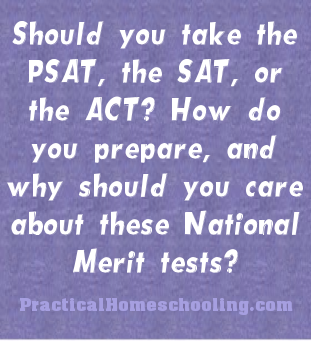PSAT/SAT/ACT and National Merit
By Jeannette Webb
Printed in Practical Homeschooling #83, 2008.
 Should you take the PSAT, the SAT, or the ACT? How do you prepare, and why should you care about these National Merit tests?
Should you take the PSAT, the SAT, or the ACT? How do you prepare, and why should you care about these National Merit tests?

|  |
 The “PSAT/National Merit Scholarship Qualifying Test” is a long title
for a little practice test that has up grown over the years into a
significant recognition program. Not only is it the gateway for National
Merit scholarships and other merit programs, but an outstanding score
puts you on the radar screen of many good colleges.
The “PSAT/National Merit Scholarship Qualifying Test” is a long title
for a little practice test that has up grown over the years into a
significant recognition program. Not only is it the gateway for National
Merit scholarships and other merit programs, but an outstanding score
puts you on the radar screen of many good colleges.
Contrary to popular belief, most National Merit Scholarships are not
that substantial, being only $2,500 (either a one-time award or spread
over four years). They only become financially significant when a
college matches the award or offers big packages to National Merit
Finalists/Scholars in the hopes of building an outstanding student body.
One example is the University of Oklahoma in our home state, which
recruits National Merit Finalists from all over the U.S. and offers
close to a full ride if you list them as your top school with the
National Merit Corporation.
If your student makes a certain score on the PSAT (the cut-off varies
from state to state), he will be notified in September of the senior
year if he is a Commended Scholar or a National Merit Semifinalist.
Semifinalists continue in the program, sending in additional tests
scores, transcripts, a short letter of recommendation, and an essay.
Most Semifinalists advance to Finalist standing, and over half of the
Finalists receive National Merit Scholarship awards.
But first, you need a good score on the PSAT.
What Is on the Test?
The PSAT is approximately 21/2 hours long and covers Critical Reading,
Writing, and Math.
The Math portion of the PSAT covers topics from your basic Algebra I
course. These specific topics are: numbers and operations, algebra and
basic functions, geometry, data analysis, statistics, and probability.
The SAT will expound on these same topics, including information from
Algebra II. So plan on finishing up Algebra I by the spring of your
sophomore year to allow concepts to gel before the test. If you can have
Algebra II under your belt by this time as well, that can only make you
more prepared and comfortable with the math.
The Critical Reading sections of the PSAT include two types of
questions: sentence completion and passage-based reading. Sentence
completion questions require the student to pick the best vocabulary
word(s) to complete the sentence. The best preparation for this section
comes from a lifetime of reading and learning vocabulary words. This is
usually the least of a homeschooler’s worries. The passage-based reading
questions are your basic reading comprehension test: read a short piece
of writing and answer questions about its meaning and perhaps the
meaning of specific words in the context of the passage. This is fairly
straight forward once a student has taken and analyzed a few practice
tests.
The Writing section has three types of questions. The first requires
students to improve sentences by choosing which answer makes the
sentence grammatically correct. The second type has students identify
grammatical errors in sentences by selecting which section of the
sentence is incorrect. In the paragraph improvement section, students
are asked to improve the readability of the paragraph by choosing
different transitions or conclusions, correcting run-on sentences,
combining sentence fragments, etc. To prepare for this, students should
be comfortable with writing and editing. One should have an intuitive
sense of grammar to be able to recognize and correct mistakes, but in
these tests students are never required to name that split infinitive.
ACT or SAT?
The junior year is filled with important standardized tests. The PSAT
will be taken in October and will be followed shortly by the SAT or the
ACT. There are also SAT Subject tests and AP tests.
One of the time management decisions you will have to make is whether to
take the SAT or the ACT or both. I recommend taking only the SAT.
To really maximize your time it is probably easiest to prepare for the
PSAT by preparing for the SAT. Remember, the PSAT is the “practice” test
for the SAT, so categories are the same and the questions are similar.
By studying for the SAT you’ve killed two birds with one stone.
There are also other reasons I prefer the SAT to the ACT. First, the SAT
is considered by many admissions officers as a more desirable measure of
a student’s intellectual ability and hence, of their ability to succeed
in college. Secondly, the SAT is accepted at any university coast to
coast, where the ACT seems to be more of a midwestern thing.
Exceptions to the Rule
While I do generally recommend the SAT, there are some exceptions.
If your state, like Missouri, awards state scholarships based on ACT
scores, and you plan to attend school in that state, go ahead and take
the ACT. Otherwise, you could miss out on thousands of state scholarship
dollars.
Some kids just score better on the ACT and feel it is a better
representation of their abilities. To find out, visit
www.kaptest.com/satactpractice and spend 90 minutes taking the SAT/ACT
Combo Sample Test from Kaplan to help you determine which test makes you
look best.
If you score significantly better on the ACT, by all means take it, as
many universities are accepting it as well. You need to do the research
early to see what test your university of choice wants. If you take the
ACT, do the optional writing section as well, as it is often now
required by colleges.
One downside of taking only the SAT is that some universities require
additional SAT Subject Tests in science if you only take the SAT. My
kids felt that it was worth taking the SAT Subject tests in a few
science areas as they could prepare more easily for specific areas
rather than deal with the preparation for and fatigue of a second huge
test.
If the ACT is your standardized test of choice, then you will just have
to spend the extra time studying for both the PSAT and the ACT.
Test Prep Recommendations
As previously mentioned, I believe that the best use of time is to
prepare for the SAT while preparing for the PSAT. You’ll get an early
start on the SAT and be over-prepared for the PSAT.
Even though the PSAT is shorter and the questions are at a lower level,
it is graded closer than the SAT. There is room for error on the SAT
(you can miss a few questions and still get a perfect score), while the
PSAT starts losing points with every mistake. There is also less time
per question on the PSAT, so pacing is absolutely critical. This is why
practicing is so important. Here are some places to start.
The College Board
CollegeBoard provides some test information, sample questions,
and, for a fee, test prep books, practice exams, and other resources.
Sign up for a free daily SAT question to be e-mailed to you. Also, as
the test maker, The College Board provides the best practice tests to
show what you need to work on. They sell a few old PSAT practice tests
and also publish The Official SAT Study Guide, which includes eight
tests.
Kaplan
Our family has found that Kaplan’s guides do an excellent job of showing
students what to review, how to attack questions, and how to pace
themselves during the test. They usually have practice tests that are
very close to The College Board’s tests. They have independent PSAT and
SAT guides.
These two are our favorites, but check out other resources, both online
and at a bookstore and find what works best for your student.
Since the SAT (and therefore the PSAT) is a “Reasoning Test,” the best
way to prepare is to get a few strategies from a good guide like Kaplan,
then practice, practice, practice. Take 1-2 tests far in advance, just
as soon as you have the requisite classes. Then, four months out, start
taking practice tests in earnest. We recommend 8-10 practice tests taken
once every few weeks to prepare. Take the time to carefully evaluate
each test and find your weaknesses, or you will not get the maximum
benefit out of the practice runs.
When Is the PSAT Offered?
If the local school allows it, students can take a practice run of the
PSAT in their sophomore year. It is an unofficial score and colleges
will never see it. My students were not ready mathematically, so we
skipped that option. I was not willing to blow their confidence by
taking it prematurely and failing. This is a judgment call by parents.
The actual PSAT that counts is taken in October of the junior year and
must be taken at a local school. Hopefully, you have a good relationship
with your local public school. If not, check out magnet schools,
Christian schools, or college testing centers. Whatever venue you wind
up with, double check the actual testing site. My very tall left-handed
son was stuck in a tiny right-handed desk his first SAT try and the
results were way below his ability. After that hard lesson, I became
much more proactive in checking the testing site conditions (Is the room
quiet? Will bells be going off? Will people be talking? Are the desks
suitable?)
Unlike most standardized tests, you have one shot with the PSAT. No
taking it over if you have a bad day. So, make it count!
Students with Disabilities
The College Board is committed to ensuring that students with
disabilities receive appropriate accommodations on its tests. They
provide a broad range of accommodations to students who provide
documentation of a disability. Check out this website.
Why Does Testing Matter?
Like it or not, top colleges view standardized test scores as good
indicators of academic potential, so you must test well to be
competitive. For homeschoolers, test scores assume even greater
importance since Mommy-assigned grades are rather suspect.
We must always remember that college is, first and foremost, an academic
pursuit. Academics count as 2/3 of the weight of your candidacy. Given
this scenario, it is wise to prepare yourself well academically and to
prepare well for standardized tests. You can decide not to jump through
the testing hoop, but that will severely limit your opportunities.
While the PSAT itself is eventually eclipsed by the SAT score in the
eyes of college admissions officers, it is worth putting forth our best
efforts because of the many other doors it can open.
Jeannette Webb has worked with high school students for over 25 years.
In 2005, Jeannette received a Presidential Scholar Distinguished Teacher
Award. Jeannette teaches “Homeschooling Through High School” seminars
and is a college coach dedicated to helping homeschool students
matriculate to America’s top colleges. She can be reached through
this website.